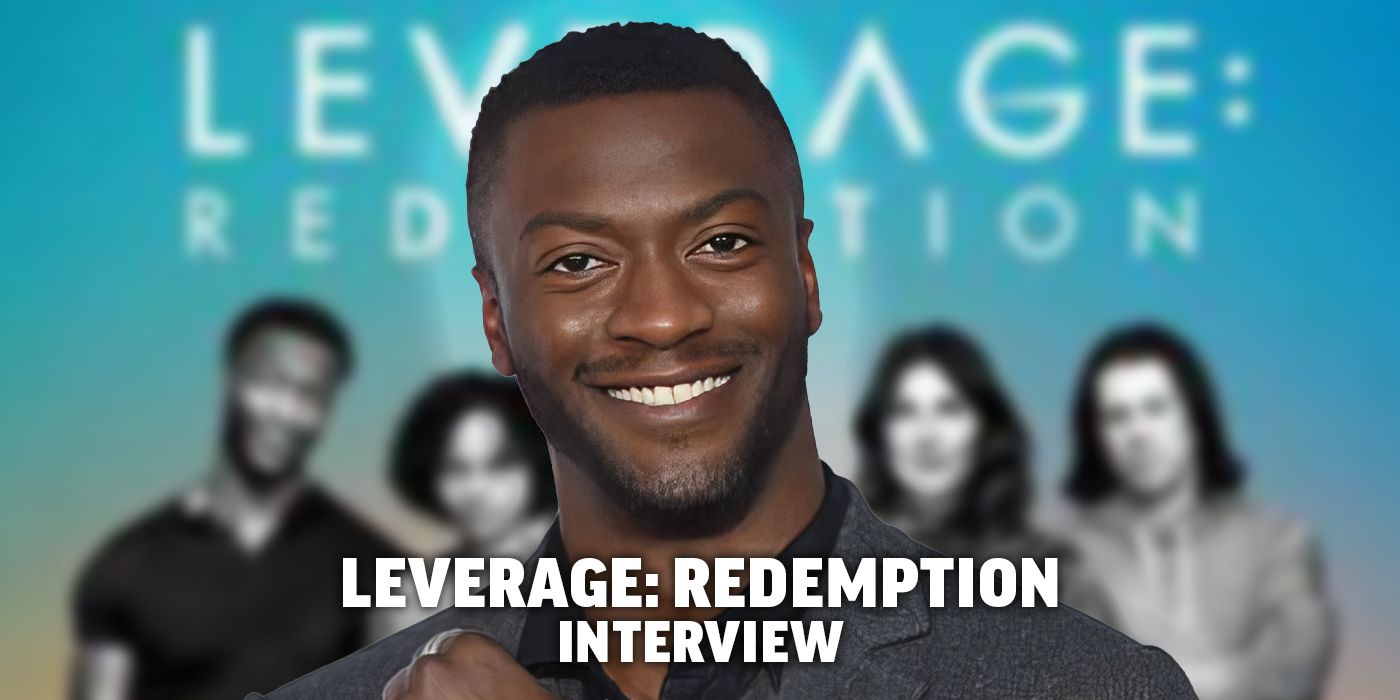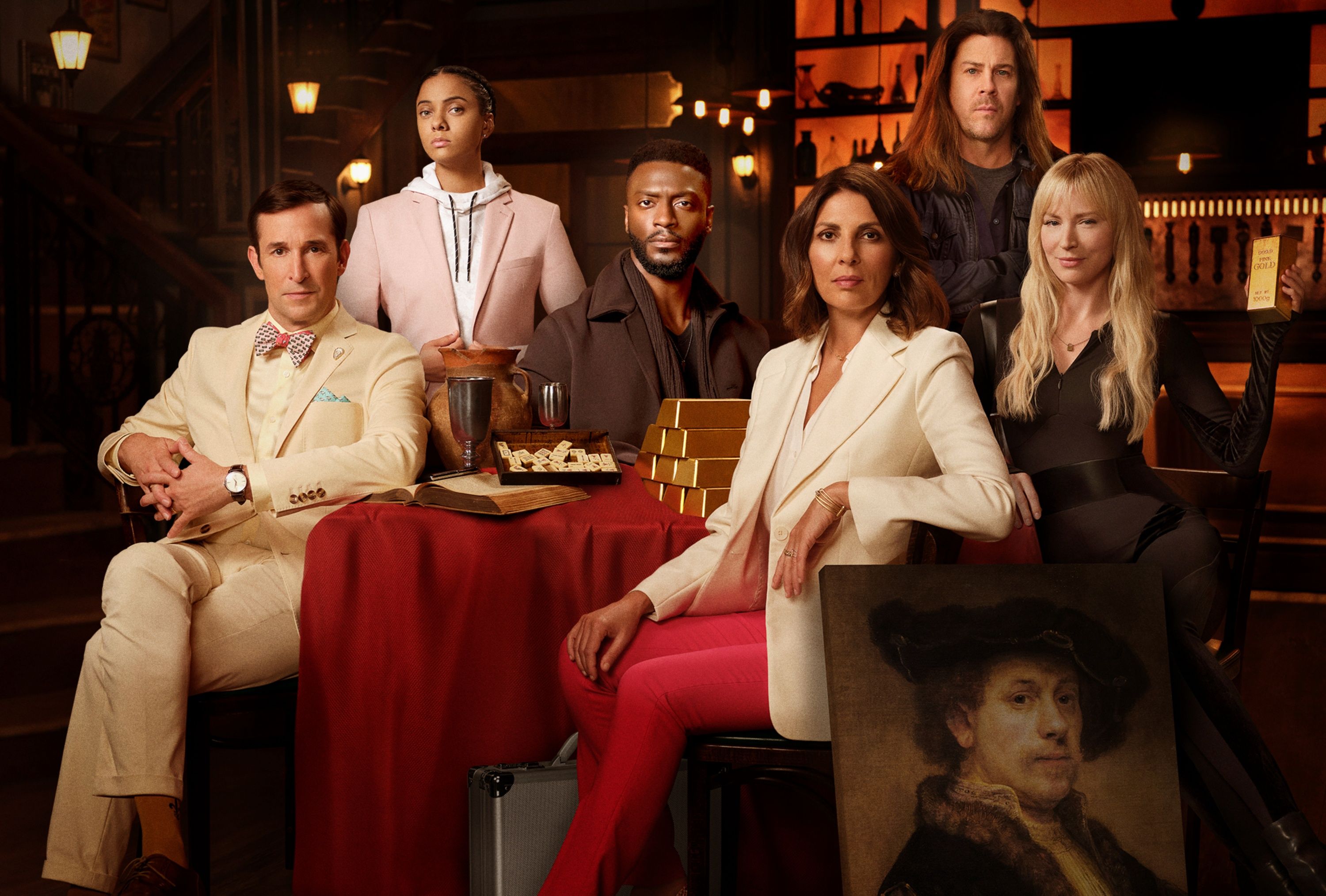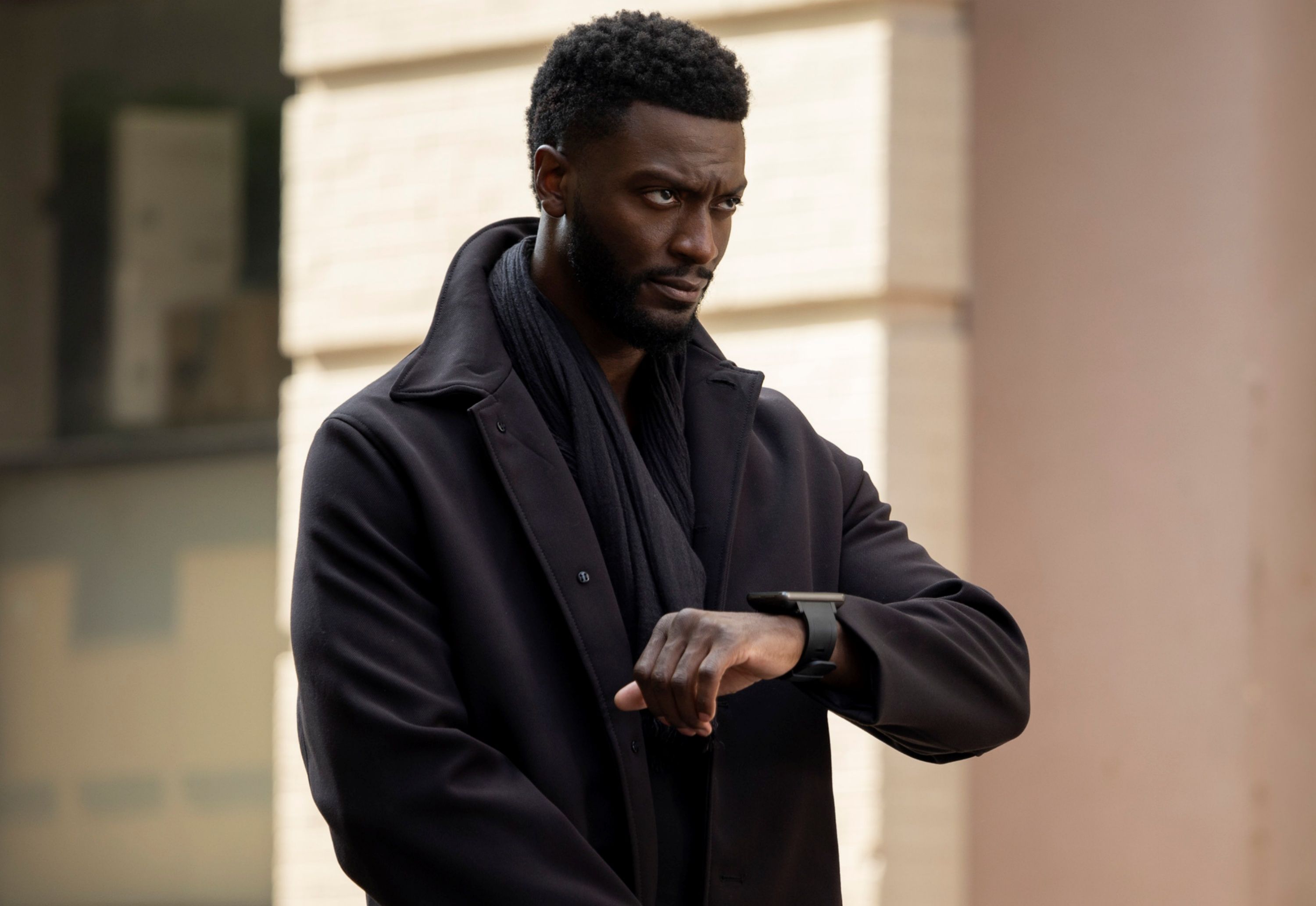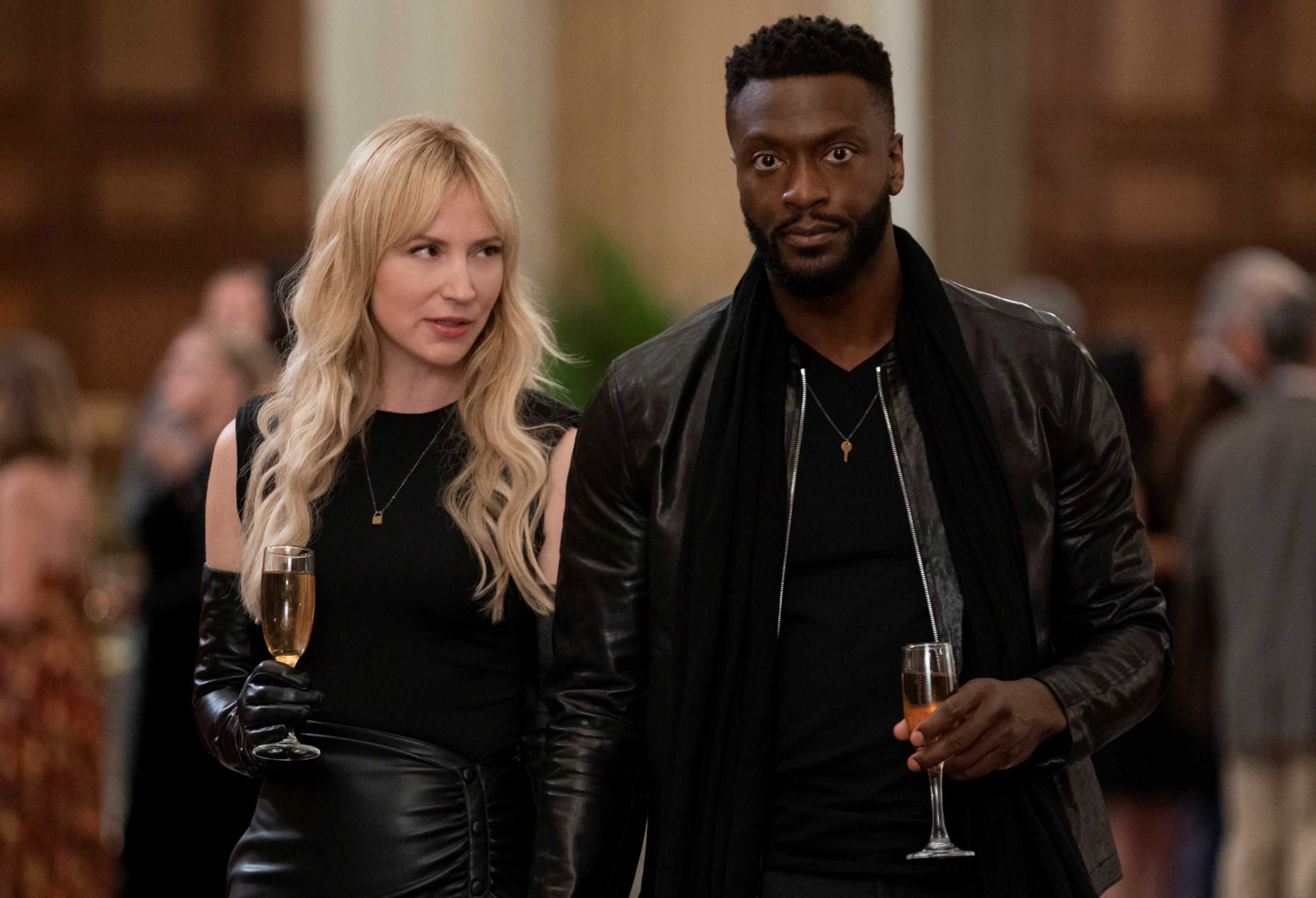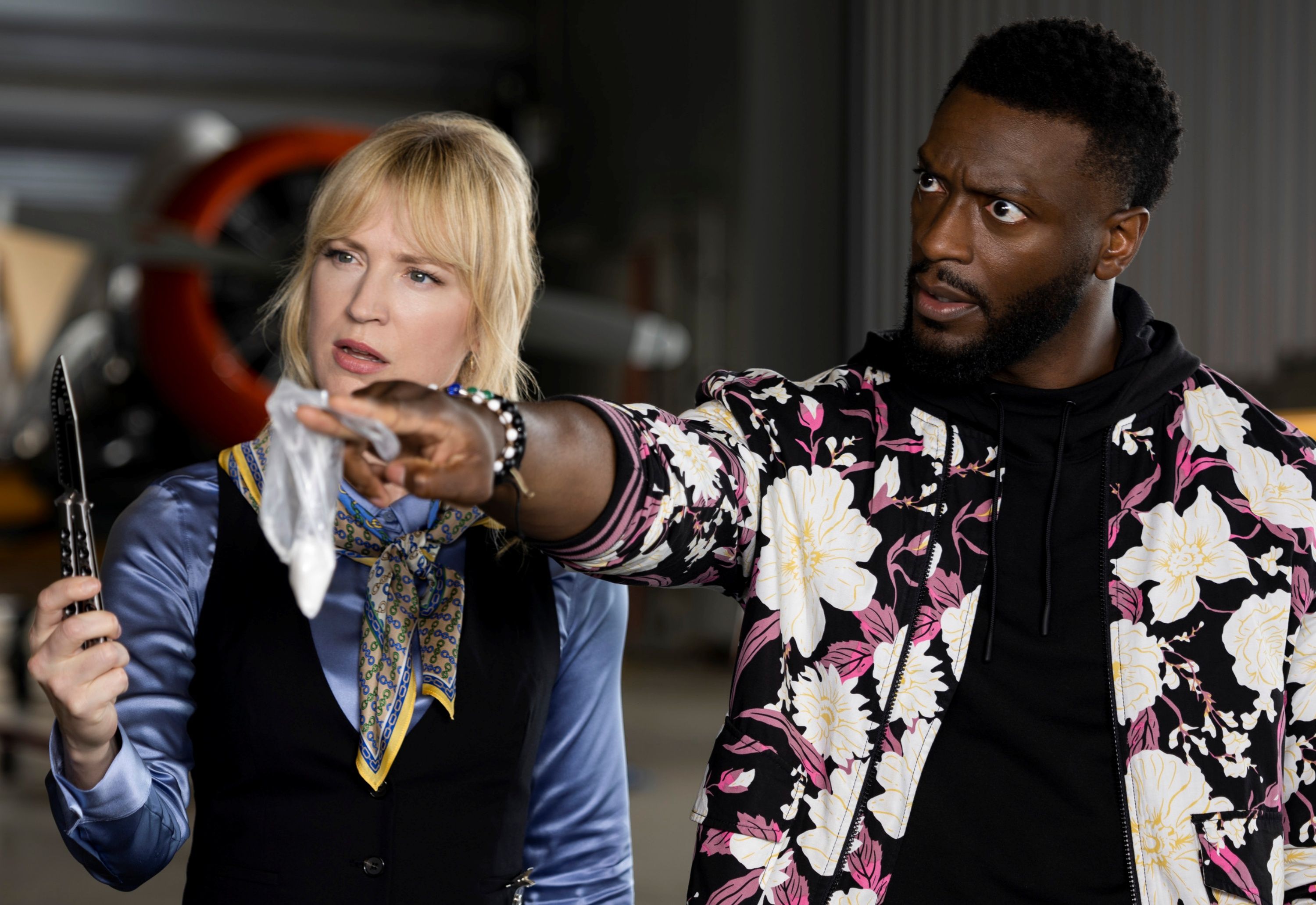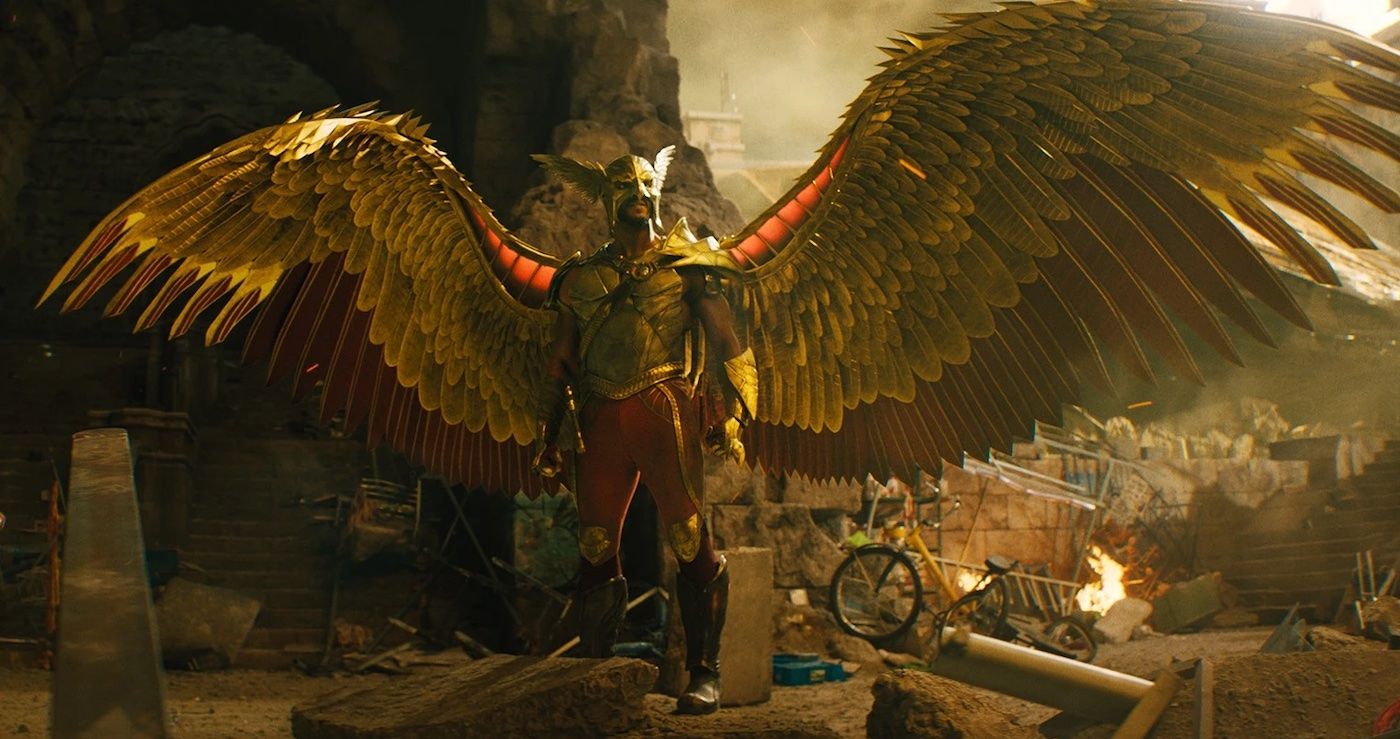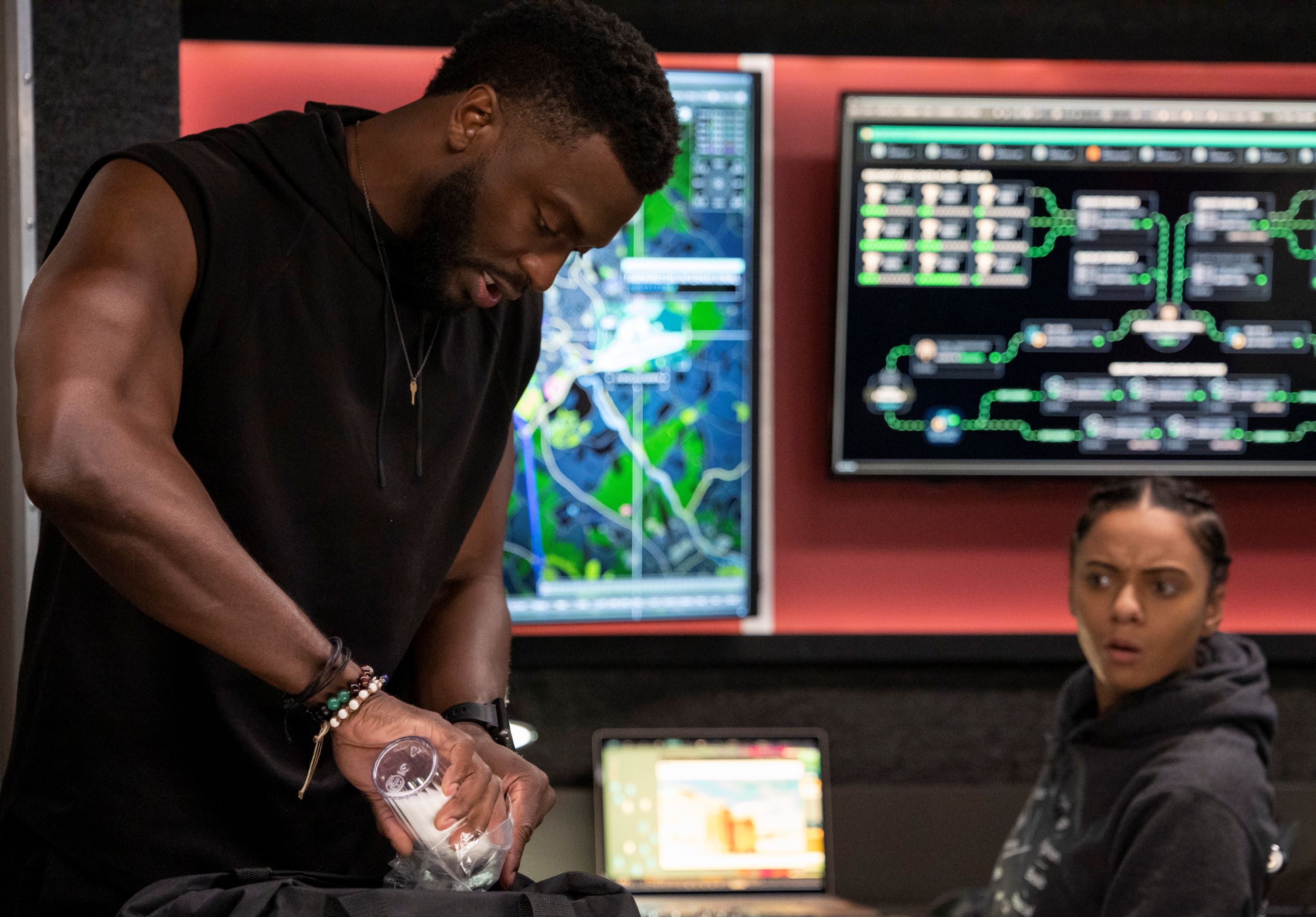In Season 2 of the original Freevee series Leverage: Redemption, the Leverage team – made up of grifter Sophie Deveraux (Gina Bellman), thief Parker (Beth Riesgraf), hitter Eliot Spencer (Christian Kane), hacker Alec Hardison (Aldis Hodge), and full-blown newest additions corporate lawyer Harry Wilson (Noah Wyle) and Hardison’s foster sister Breanna (Aleyse Shannon) – continues their quest to help individuals taken advantage of by bad guys, always teaching them a memorable lesson and having a bit of fun while they do so. As long as they’re working together, the team has never met a challenge they can’t get creative enough to find a way to overcome.
During this 1-on-1 interview with Collider, Hodge talked about how cool the experience is to get to return to a job and character that made such a mark on his earlier years, why it’s been important to him to do as much as he can on the series while juggling his other projects, how he sees directing in his future, the importance of fans getting to see more of the Hardison/Parker dynamic, the impression that Leverage co-creator John Rogers made on his career, and understanding what’s made the series so successful. He also talked about why he wanted to take on the role of Alex Cross for the upcoming Amazon series Cross and his involvement as a producer, working with his brother Edwin Hodge on the sci-fi thriller Parallel, whether he’s spoken to James Gunn about the future of the DC Universe, and how he feels about the end of City on a Hill.
Collider: The original Leverage TV series was a project that you did before you started doing all of these other major and cool projects that you’re doing now. What has it been like for you to have the ability to revisit the series and the character, while you’re also at this very different stage in your career, at the same time?
ALDIS HODGE: It’s actually a very cool experience, but also an enlightening experience, to be able to be in this particular position and go back to a job that was really quite formidable for me, in my earlier years. It is strange to be able to have this moment in my career. First of all, the rarity of everything is what surprises me most, when it comes to Leverage. How many times do you get an actual chance to get a redo, or have a second chance at something that you started? To be able to come back to Leverage, in this position in my career, it feels like the forward trajectory and everything that I’ve done up to that point, and the reason why I took Leverage to build out a career, all amounts to something. It all made sense, and that’s what I love the most. It just feels like it’s come around full circle. This time with Leverage, I get to enjoy it in a completely different way because I get to sit and observe it from a very different perspective.
Has it always been important to you to find time to at least have some part in the season, even if you are so busy with everything else you have going on?
HODGE: Even during the season, I would always try to do more things. I would try to write. I try to be a staff writer, as much as possible. People were like, “You’re crazy. You can’t be a staff writer, writing up the shows while you’re sitting here as a lead on one show.” In between seasons, I would try to write specs scripts and submit them to different people. I wrote a spec script for Heroes. I wrote a spec script for The Office. I was always trying to do a multitude of things. If anything, it just taught me how to multitask at an earlier stage in my career. Beyond that, it taught me how to multitask with efficiency. The biggest part of maintaining success and consistency is really just figuring out what your means of consistency looks like.
Not to add more things to your list of things, but with some of your co-stars stepping behind the camera and tackling episodes of the show as directors, is that something you’ve thought about or considered doing?
HODGE: Sure. I’m an executive producer now. I was an executive producer on my last show. I’m producing my next show. Along with that comes various different tasks. I like to try to write and oversee as much as possible. But as far as directing, that’s definitely in the pathway. Beth [Riesgraf] directs. The only regret I have from these last couple of seasons of Leverage is that I have not been able to be directed by Beth yet. But that’s definitely in the cards for me. Right now, everything is writing, developing, structuring, and preparing projects, but that is where we’ll get to eventually.
When you started playing Hardison, could you have ever pictured him getting to the point that he’s at now? He’s this confident, suave guy who’s at the top of his game, and he’s running these other teams. Do you feel like this would always have been his natural progression, or have you been surprised with where he is?
HODGE: I believe that how you start is how you finish. How I played him, from the beginning, was always with the intent of true leadership because I felt like the characters, individually, were all leaders in their own right, with all the different things that we did. We all relied on each other, equally. We all had very prescient and valuable skill sets. So, for me, Hardison was always a leader. Running into this particular position now, it’s just par for the course for where his individual story was going, this entire time. I’m very happy that we got to this place, but no, I’m not surprised.
I love that we get to see him and Breanna bickering and verbally sparring with each other. He hasn’t been around, so he doesn’t really know how valuable she’s become. What did you enjoy about having those moments? Do you feel like it was important for him to get to a point where he not only recognized how valuable she’s become, but that he actually expressed that to her?
HODGE: It’s not even a lack of value. He has been around. He’s working, but he’s always kept in touch with his sister. They’ve always been close. What he has to do is stop seeing her as the little sister and this person that needs all this protection, and start recognizing her as a grown, full human being, who’s actually capable of protecting herself. She’s somebody who can teach him something, which is sometimes tough for big brothers.
I’ve got a little sister myself and I sometimes look at her like, “Oh, this is a grown woman. She’s got her own ambitions, and I don’t have to always be right there to try to protect her from ugliness of the world.” He’s always loved his sister. The only reason why they’re in this space is because of the close relationship they have. But I also believe that, for him, it’s about trying to see who she is, as an individual, more than just, “This is my little sister.”
It’s such a fun dynamic to watch because it does feel so relatable.
HODGE: The magic that works is that everybody has their own individual special relationships. That’s what they use to create what their world is, that teamwork alliance and that family dynamic that they have. That’s what the audience relates to the most, which I’m happiest about. I’m really glad to see that they’ve now brought Hardison’s family into it. The question that I had during the first five years of the original show was, “Do we ever get to see who Hardison’s family is?” He was always talking about Nana. I wanted to know what his backstory is, where he came from, how he came up, and all those things. I love that we get to explore it now, and I think that Aleyse Shannon does a brilliant job. She’s really fantastic.
I also love the fourth episode of Season 2 because we get to see Hardison and Parker spending some time together.
HODGE: Finally, after years.
It’s fun because you can tell they both love what they do. They’re essentially on a date while they’re also on a job. What was it like to shoot that episode and to get to have moments, like with them dancing down the hallway while they’re talking about picking a lock?
HODGE: For Beth and I, it was really important because this was the first time that the audience has been able to see Hardison and Parker in this element. It’s been a long time coming. We’ve been doing a dance with the audience for a long time, and we wanted to make sure that there was real fun, real love, and a real big payoff for the audience, to finally be in this moment with them, so we can see how they tick. This is what they do for fun. This is their regular, average, every day, and it’s the thing that brings them together. We get to see a more vulnerable side. For Beth and I, it really was just a great deal of fun, but it was also really important to have the audience feel fulfilled when they left that episode.
Did you debate, at all, jumping so quickly back into TV, with doing Cross, or was there just no way that you were going to pass up playing that character?
HODGE: No, there was no debate there. There was no debate, whatsoever. I love all mediums of my world, whether it’s film, TV, voice work, it doesn’t matter. All that matters is the content. Is the job substantial, in terms of story? Is it rich in context? Those are the things that I pay attention to. So, when I read the script for Cross, it had been a few months of me trying to figure out what the next job was. My team and I were going over a few different offers that came across the desk. But when Cross came, it was pretty much immediate, the magnitude of what the legacy of Cross is. And then, going into working with Ben Watkins, our creative showrunner, was amazing. He wrote a brilliant script that had all the elements that I really wanted to touch on next in my career. It was just right up my alley.
Have you started filming that yet?
HODGE: No, we’re in pre-production right now. We’re getting everything ready – costumes, casting, sets. We start filming in January.
As a producer on that, how involved are you in other aspects of the series? Are you involved with character development and with deciding episode count? How much into all of those little details do you get?
HODGE: Our character development is pretty well-established at this point already. At this point, it’s mostly the casting and the regular producorial things of getting the looks down, costume, hair, all that kind of stuff. Really, the primary thing in this stage for us is casting.
Have you been reading all the books? Do you feel like an encyclopedia of Alex Cross now?
HODGE: No, definitely not. I say that because I’m becoming one. I’m definitely jumping into the books and getting everything sorted. I was able to chat it up with (author) James Patterson. That was awesome because I got to understand what his initiative for creating Cross was, in the beginning, which is awesome. It’s basically drinking right from the source. But I definitely want to dig more into different aspects of the books to understand where the narrative has been, just so I can understand how we can take it to the next level.
You’ve also teamed up with your brother, Edwin Hodge, to make Parallel, which sounds like a cool project. What made you want to do that project together? How do you know when it’s something that you want to work on together?
HODGE: With Parallel, a buddy of ours, (producer) Jaylen Moore, brought that to us. Initially, we were just on it, in the very early stages, to act in it, but as the project developed, we got more involved. Then, we co-wrote it with John Keasey, and we also produced it. For us, it was just the value of the project. We thought it was a cool one to really stretch out, story wise. It’s an adaptation from a Chinese film, the original called Parallel Forest. We just thought that it had massive story and entertainment value, but also, the story was pretty cool. It was an opportunity for us because we were already going down this road anyway. It was an opportunity for us to get out in front of this and put it together, and see how well we could manage putting together a film. It is no easy task. We’re still working on it. We’re still in a space of editing and all that. We’ve always had the plan to work with each other, buy it was about finding the right thing. Right now, with our production company, we are very heavily developing and seeking projects that have great potential and that fit the mold of where we want to go.
It’s very cool that, along with having something like Leverage, that you can keep going back to, at different points in your life, you and your brother are also at points in your careers where you can work together. That doesn’t always work out for a family.
HODGE: It does not work out, but for us, it’s been a long time coming. We’ve both been in this industry, me for 33 years now, and my brother for 34 years, and it was always building up to this point. If we were not here, at this point by now, then we’d be doing something completely wrong. But it’s about planning. You’ve got to have a goal that supersedes where you are.
I remember that I definitely wanted to write TV. I wanted to produce, eventually, and get into that. It took me a while to find the drive or the interest to want to direct, but that’s there. But when I did Leverage, meeting John Rogers and having a conversation with him about how and why I was cast, John took a risk and stuck his neck out for me, to give me his support. I was like, “Okay, one of these days I want to do what John does.” I want to be in that position to actually give somebody a shot who deserves a shot. John Rogers really was the guy that initially taught me that I can have some faith in this industry and people in this industry. Up to that point, it was hard. You’ve got to have a plan. You’ve got to know that you’re doing what you want and going where you want to go, and you’ve got to be consistent about your execution. You’ve got to be relentless about execution. With my brother and I, we’ve always had this plan. We’re just executing now, or trying to execute.
It was very cool to see your involvement in Black Adam and to see how well that movie was received.
HODGE: Oh, thank you.
Have you spoken to James Gunn yet, about the future of DC? What was your reaction to learning about his involvement in the DC Universe now, moving forward?
HODGE: No, I haven’t spoken to James. As far as the reaction, I know James has done some really great work with [Guardians of the Galaxy] and Suicide Squad, so it gives me a great deal of confidence in what his vision can be for DC. I’m looking forward to seeing what he and Peter Safran come up with, and am definitely looking forward to continuing telling these stories about the JSA/Black Adam Universe.
It’s funny, I haven’t run into James in a bit, but I remember meeting James randomly one time, years ago, when I was over at my god sister’s house. We were all playing a game called Mafia, and James was actually teaching us how to play. He probably wouldn’t remember, but it’s funny to think about that, now that we’re at this level. Back then, I never would have imagined that would be the case. Now, working with that guy in this big of an arena is pretty awesome.
Hawkman is such a cool character that I can’t imagine how you stop yourself from thinking about all the things you’d like to do with him while you’re waiting to find out when that might happen.
HODGE: That’s the thing, I don’t even wait. I’m already like, “Look, here are my ideas. When y’all are ready to go, here’s what we’re talking about.”
City on a Hill came to an end with its third season, even though people thought the series might get a fourth season. How do you feel about the way that series ended? Do you feel like it ended on a good note? Do you wish you’d been able to do another season? How do you feel about the way it wrapped up?
HODGE: You’re trying to come in with the tough questions. For me, I feel the same about that show as I did with Underground. I feel like, with that, we weren’t able to really fulfill the full weight of those stories, and it would’ve been awesome to be able to finish those storylines out. But we did three great seasons, and I had a great time doing it. Working with the cast was amazing. Kevin Bacon is awesome. I had a good time there. I definitely wish that we would’ve had the chance to wrap up some of those storylines because I had some ideas. But it lived its life in the time we had, and what we got out of it, I’m very happy with.
The weird thing about TV is that you never quite know when it’s going to be done.
HODGE: Yeah, you never know. But it’s all right cause it keeps you on your toes.
What’s it been like to work with this Leverage team and this cast, over all of these different seasons, and to be working with them again now? What have you learned from them, over the years?
HODGE: In terms of learning, it was more or less about learning how to work with one another and how to be in this space together. I think we all came in pretty confident and well-vested in our skill sets. I came into the show pre-seasoned. Even though I was 21, I still had almost 20 years under my belt. I was very much aware of who I was, as an actor and as a performer, and what I wanted to do with the character. But as far as us figuring out what our synergy was and what our rhythm was, as a team, that’s the thing that we found naturally and organically. That’s capturing lightning in a bottle. That’s what makes it work. These relationships and this kind of rapport is what carries through on screen and is very evident. It shines through. Understanding the organic nature of what made the show successful was one of the biggest educating factors of the experience for me.
Leverage: Redemption is available to stream at Amazon Freevee.

